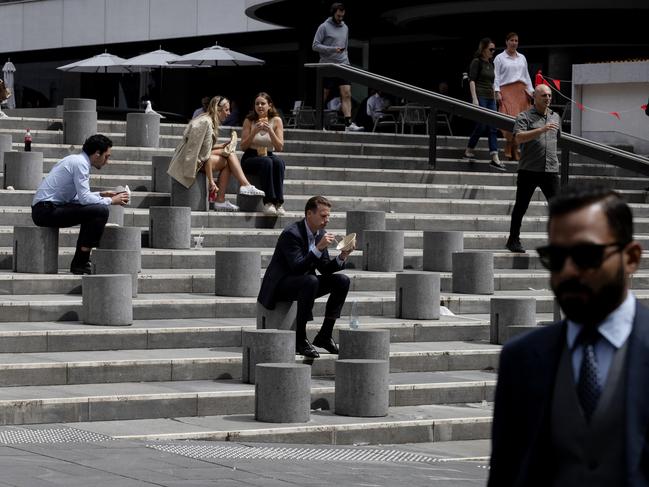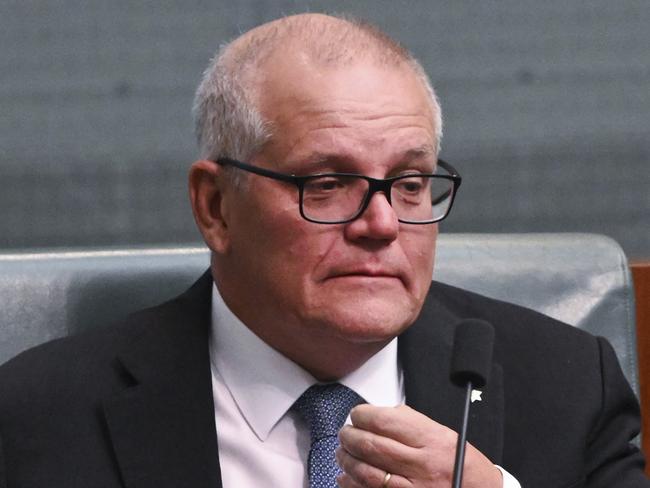‘Terrible’: Top economists take aim at mega tax cuts that will mostly benefit the rich
Chances are you’ll score a tax cut from the middle of the year – unless a concerted campaign by economists to claw it back succeeds.
Work
Don't miss out on the headlines from Work. Followed categories will be added to My News.
Chances are you’re about to get a fairly decent tax cut from the middle of the year, putting cash back in your pocket – that is, unless a concerted campaign by economists to claw it back succeeds.
A long list of experts claim the third stage of major income tax reforms, designed and legislated almost six years ago and due to take effect from July 1, are expensive, unfair and counterintuitive.
But Prime Minister Anthony Albanese insists the benefits outweigh the enormous cost, which is almost as much as Australia spends on subsidised medications and more than is forked out on higher education.
“I know there’s ongoing debate about the impact of those tax cuts, but we support reducing tax,” Mr Albanese said last week.
“We’re doing what we can to address cost of living pressures. Part of that will be given income tax relief, and that income tax relief will be important for people.”

Stage three abolished the 37 per cent income tax bracket, which currently applies to those earning between $120,000 and $180,000, and introduces a flat rate of 30 per cent for those with salaries between $45,000 and $200,000.
The reforms will cover 95 per cent of workers, but the benefits are far from universal, many economists argue.
Pressure is mounting on the government to either abolish or alter stage three, with social welfare groups and economics experts alike agreeing it’s unfair and ineffective in its current form.
A ‘terrible’ plan
Greg Jericho, chief economist at the progressive think tank The Australia Institute, said the stage three tax cuts are “terrible” because they “cost too much, deliver little benefit to those who need it, and leave Australia less fair”.
“The … latest calculations estimate that over the first 10 years, the Federal Government will collect $320 billion less tax revenue than it would have done otherwise,” Mr Jericho said.
“In the first year alone, the cuts are estimated to cost $21 billion in foregone revenue. This is $1 billion less than the entire budget surplus for 2022–23, equal to the annual budgeted expenditure for financial support for People with Disability in 2024–25, and some $6 billion more than the amount budgeted for Job Seeker Income Support.”
Together with colleague Matt Grudnoff, an economist with The Australia Institute, he proposed four alternatives to the plan.
“All four alternatives cost less than stage three,” Mr Jericho and Mr Grudnoff say.
Each delivers “better tax cuts” to those most battling bracket creep and inflation, and they give the government the ability to juggle tax cuts with continued service and infrastructure investment.
A win for those who don’t need it
Stage three was designed and legislated almost six years ago under the stewardship of then-Prime Minister and former Treasurer, Scott Morrison.
A lot has changed since, Professor John Quiggin from The University of Queensland’s School of Economics argued.
“They were planned on the basis of economic projections that now bear no relation to reality,” Professor Quiggin wrote in an article for The Conversation.

The first two stages were “smaller and largely designed with the political goal of smoothing the path for stage three” but their benefits are now largely gone, he added.
“Because of the unexpected acceleration of inflation, most of the tax relief these cuts provided for low- and middle-income earners will be eroded by bracket creep – the process by which inflation pushes incomes into higher tax brackets, even with no change in the real value of those incomes.
“Stage three massively favours high earners, with 70 per cent of the benefits going to the 10% of taxpayers who earn more than $120,000 a year.”

Professor Quiggin believes “no-one can now see [stage three] as a sensible response to economic difficulties likely to worsen over the next couple of years”.
Lyn Morgain, chief executive of the charity Oxfam Australia, said the government “absolutely must abolish stage three”.
“It is absolute lunacy that a time when Australia cannot adequately house its own people or contribute our share to the global crisis, we are giving away money to the top end of town,” Ms Morgain told ABC Radio.
Undermining the RBA’s efforts
When the Reserve Bank began aggressively hiking interest rates in mid-2012, then-Governor Philip Lowe released a video address justifying his decision.
Red-hot inflation had to be brought down as quickly as possible, and so the RBA sought to “slow the economy, to get things back onto an even keel”.
In his video Mr Lowe explained that higher interest rates snatched money from mortgage holders, made it harder for people to borrow money, made consumers “feel less happy”, and put downward pressure on home prices, all so consumers “don’t feel as confident and they don’t spend as much”.

While painful, especially during a cost-of-living crisis when it seems just about everything costs more, the RBA has repeatedly insisted the hard-to-swallow medicine is necessary.
“So why on earth are we scheduled to do the opposite?” Peter Martin, visiting fellow at the Crawford School of Public Policy at the Australian National University wrote in analysis for The Conversation.
Stage three tax cuts will put “an awful lot of money into people’s hands” to the tune of $15.7 billion in its first year – a significant undermining of the RBA’s efforts.
“By way of comparison, that’s almost as much as the $16.3 billion that will be spent on the Pharmaceutical Benefits Scheme, and more than the $10.5 billion that will be spent on higher education,” Mr Martin said.
Here's 17 reasons why the Stage 3 tax cuts should be scrapped 🧵 #auspol
— Australia Institute (@TheAusInstitute) January 15, 2024
1/ There are much fairer (and cheaper) ways to give people a tax cut
Here are four alternatives, each of which would deliver a bigger slice of the pie to 80% of taxpayers.https://t.co/HxAuuRiOSQpic.twitter.com/9TTYCpMz46
In an opinion piece for The Australian Financial Review, former Treasury official and director of Outlook Economics Peter Downes said the potential consequences of stage three are significant.
“Dumping $20.4 billion into the economy will make the RBA’s job harder, and mean the cash rate will be higher than otherwise,” Mr Downes wrote.
“High-income households, who have been doing very well, will see their incomes boosted. The squeeze on mortgage borrowers will be larger and longer. And fewer houses will be built.
“The government should revisit, revise and compromise.”

Mr Albanese has insisted stage three has been “factored in by the RBA in their considerations already”.
Government seems stuck with it
At the time the tax reforms were announced, the Labor Opposition staunchly opposed them, but switched tact in the lead-up to the election.
At various points since winning government, Labor has explored pathways out of stage three, with Treasurer Jim Chalmers asking his department for options as recently as late last year.
But the government is stuck, by all accounts. It went to the last election pledging to push on with the final part of the Coalition’s reforms.
And according to reports, Mr Albanese recently told concerned backbenchers that breaking an election commitment would inflict serious damage.

Mr Jericho concedes dumping stage three “is a tough political sell”.
That’s why Emma Dawson, executive director at policy think tank Per Capita, described stage three as “politics over policy – and no way to save our struggling economy”.
In justifying his support, Mr Albanese insists those on salaries as low as $45,000 will benefit.
And while that’s true, analysis published by The Australian Financial Review reveals that financial pay-off is a meagre $125 per year.
In stark contrast, those raking in $200,000 will pocket an extra $9000.

“The Albanese government is left [a] dilemma – a choice between growing debt and cutting expenditure on vital services,” Professor Quiggin said.
“At a time when wages are failing to keep pace with inflation, while profits are booming, it’s not the kind of choice any government would normally like to make.”
Originally published as ‘Terrible’: Top economists take aim at mega tax cuts that will mostly benefit the rich



